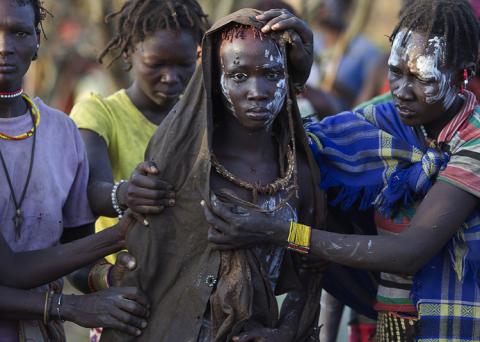Advertisement
African survivors of female circumcision call for help with mental trauma
DAKAR (Thomson Reuters Foundation) - African survivors of female genital mutilation (FGM) said mental health services are their biggest need and urged governments and charities to provide support for dealing with long-term trauma.
Survivors and activists from across the continent attending a summit on FGM and child marriage in Senegal this week said mental health should have been on the agenda.
Common in 28 African countries, FGM is often seen as a rite of passage and justified for cultural or religious reasons but can cause chronic pain, infertility and even death.
"We don't have mental health services for survivors of FGM - that is a big thing that is missing in Africa," said Virginia Lekumoisa, a survivor from Kenya who works for the government on children's rights.
FGM typically involves the partial or total removal of the external genitalia and is practiced on girls from infancy to adolescence, with the World Health Organization (WHO) estimating about 200 million women and girls have undergone the procedure.
World leaders pledged to end the practice under a set of global goals agreed in 2015..
Cut at 18 against her will, 29-year-old Lekumoisa said she has never received any services to help with the trauma.
"There's this picture that has never left my mind of the blood," she told the Thomson Reuters Foundation.
She works with survivors at shelters in Kenya and said they are desperate to talk to someone about what they went through but the topic remains taboo.
If more survivors received mental health support they might be empowered to speak up and help end the practice, she said.
Aida Ndiaye, 35, from Senegal, said she never had suffered physical complications but the trauma of being cut when she was six years old had stayed with her.
"I remember my sister screaming, 'They're going to kill Aida!'," she said, shaking as she told her story. "I've never been able to forget those screams."
She has never spoken to her parents about it, she said.
Mental health services are lacking in Africa in general, with less than one mental health worker for every 100,000 people, according to the World Health Organization.
Fatoumata Seyba, an activist from Mali, endured a different kind of trauma when her mother-in-law cut her baby daughter without her knowledge. Seyba was against the practice, but her husband's family disagreed.
"It's not easy for a mother to see her baby bleeding and not be able to console her," she said.
Having grown up with friends who told her about their nightmares and shame after FGM, she wants to make sure that her daughter does not suffer in silence.
"I am going to talk to her about it," Seyba said.
(Reporting by Nellie Peyton; Editing by Michael Taylor)



















Add new comment